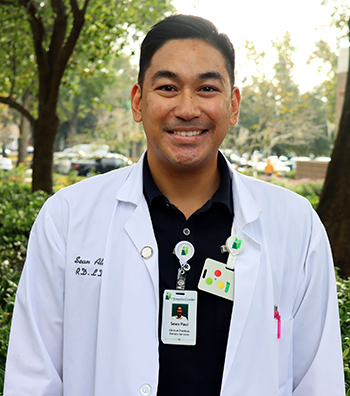Hospital nutrition 101
Nutrition
St. Joseph’s/Candler meets patients’ nutritional needs with the help of on-staff clinical dietitians
St. Joseph’s Hospital and Candler Hospital have a lot of patient beds between the two hospitals. At full capacity, that’s a lot of meals we are making for our patients.
And they are not all the same. If you are in the hospital, you may have a totally different meal than your neighbor. That’s because we individualize each meal to meet each patient’s nutritional needs.
It’s a team effort to accomplish this. Nurses use the Malnutrition Screening Tool, which prompts dietitians for a nutrition evaluation, or if the nurses have any concerns, they bring it to the attention of one of our many clinical dietitians we have on staff. Physicians also may notice malnutrition or other dietary needs and ask the dietitian to work with the patient. Our dietitians in turn work with our catering team in nutritional services to make sure meals are prepared to meet the nutritional needs of every patient.
Our dietitians also help with patient diet education and counseling and use nutrition to treat most diagnoses.

“Every patient is different and that’s the fun part,” says Sean Alva, registered dietitian at St. Joseph’s Hospital. “I like the individualized goals and plans we make for each patient, and we follow up with them to make sure we are achieving these dietary goals to help get them healthy and home.”
Say for example you come in for a heart procedure that requires a hospital stay. You will be placed on a therapeutic cardiac diet, Alva explains, but that diet can still be tailored to meet your needs. If you are malnourished, you may need more calories than someone else on a cardiac diet. If you have a wound on top of your heart condition, you may need more protein, which helps wounds heal faster, Alva says.
If you have diabetes, you may need less carbohydrates than other patients. “We try to cater to each individual patient’s needs and goals.”
That includes patients with nutrition restrictions and lifestyle, such as those allergic to certain foods, those who can’t have gluten or those who are vegetarian or vegan, or individuals with cultural and religious preferences.
What about our patients on ventilators or who can’t swallow food?
For our patients who are on ventilators, dietitians are an essential part of the healthcare team to make sure vented patients meet their nutritional needs. These patients are some of the highest nutritionally at risk and require close monitoring by our dietitians, Alva says. The dietitian assesses these patients and determines the proper nutrition prescription via feeding tube and supports the patient’s medical status and promotes healing.
“We look at the big picture and what’s going on with the patient that got them to this point,” Alva says. “Then, we anticipate their needs based on their condition and the medications they are receiving to meet their nutritional needs.”
And for our patients with dysphagia, or who have impaired swallowing, often as a result of a previous medical condition such as a stroke, the dietitians will provide full nutrition assessment and manage tube feedings or nutritional intakes on modified textured diets to assure adequate nutrition is being met.
Our food is delicious and yummy
Like cafeteria food, hospital food hasn’t always had the best reputation, but we don’t believe that’s the case at St. Joseph’s/Candler.
“Our food here is delicious. It’s yummy,” Alva says. “We follow MyPlate, so you’ll have your protein and your vegetables, both starchy and non-starchy vegetables. We have a variety of colors on your plate. It’s a variety of food.”
MyPlate is the dietary guidelines for Americans from the U.S. Department of Agriculture. It recommends portion sizes for proteins, vegetables, fruits, grains and dairy that should be included on your plate.
We also follow the daily recommended intakes on the American dietary guidelines for vitamins, nutrients and other supplements that you should be getting daily.
Again, Alva stresses each meal is tailored to each patient, and while that’s a lot of food to keep up with, it’s all about the overall care you receive to get better.
“Following my patients, especially the ones in rehab because they are often here longer, we get to see them transition and improve nutritionally and that’s really fulfilling to see that process and be a part of it,” Alva says.